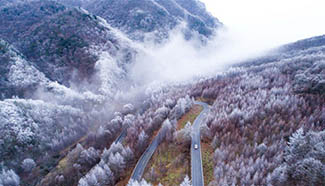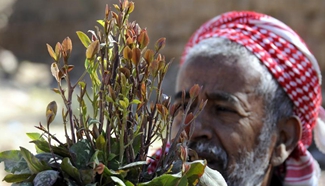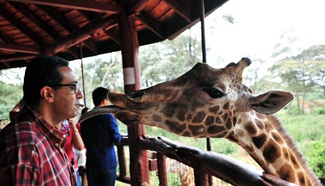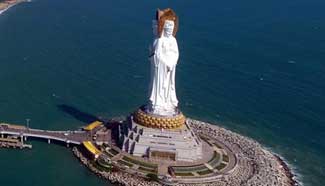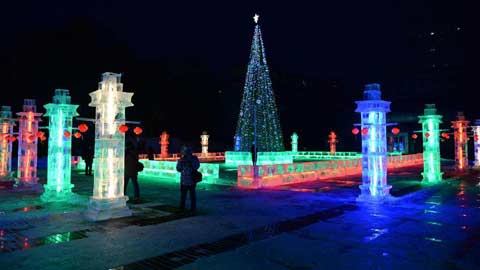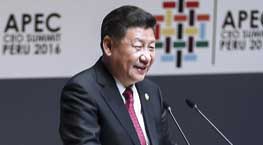SHANGRI-LA, Yunnan Province, Dec. 26 (Xinhua) -- Until 18 years ago, Zhang Yongzheng and his wife He Axiang asked different deities for help when they had troubles in this corner of southwest China's Yunnan province.
The husband, a Tibetan ethnic, would go to a Catholic church near their home and pray to Jesus, while his wife of Naxi ethnic group would go to a lamasery and beg help from Buddha.
It did not make them uneasy.
"We believed in what we believed," Zhang said, "Many of our neighbors are like us, family members believing in different religions."
Zhang, 54, was once a teacher of literacy but now runs an inn and grows grapes at the riverside in Cizhong village, Deqen County in the hilly plateau of the Tibetan Autonomous Prefecture of Deqen in the province's northwest.
Some guidebooks call Deqen County "fairytale wonderland."
Many locals believe what British novelist James Hilton described more than 80 years ago in his fantasy "Lost Horizon" about Shangri-La was Deqen.
In the local Khampa Tibetan language, Deqen means "bliss and peace", while Shangri-La means "sun and moon in our hearts."
The idyllic mountain wonderland emerged from the mist in 2002 when Zhongdian County in Deqen prefecture was authorized by the State Council to rename itself Shangri-La.
What makes Cizhong so different is a Catholic church built by a French missionary 150 years ago. Today, most villagers describe themselves as Catholics, while others still stick to Tibetan Buddhism.
For Yang Liying, 27 and an ethnic Hui who married Tseri Norbu in November, religious differences in Cizhong are no problem at all.
"While others burn incense and pray to the Buddha, I make myself busy with other things," Yang said, adding, "I won't convert."
She is a Muslim. Her husband is a Buddhist.
The signs of peaceful religious and ethnic coexistence are more obvious in the town of Shengping, where a mosque's green dome rises beside a white Buddhist pagoda.
Dozens of steps away from the mosque lies the home of Li Zhongyi, 63, whose two-storey house tells of cultural blending. On the first floor are two living rooms decorated with different religious symbols. One in the Tibetan style has an incense burner, a butter lamp and a statue of the Buddha for his 90-year-old mother Drolma Lhatse, devout Buddhist and a lifelong Deqen resident. She would chant sutra, burn incense and serve the living Buddha. The Hui-style room has Arabic tapestries where Li entertains his Muslim friends.
"We have different beliefs in our family," Li said. "We tolerate and respect each other as part of our daily lives."
Atheist Li has been a member of the Communist Party of China (CPC) for 31 years. His eldest daughter and son-in-law are also CPC members. His brothers and sisters are Muslims.
Such diverse faiths under the same roof are mainly due to the cosmopolitanism tradition and what Li described as "complex" ethnic composition of the family.
Li's ancestors had a Han bloodline. His mother and wife are Tibetans, his brothers and sisters Hui, his brothers-in-law Han, Yi and Bai.
This cosmopolitanism is unique to Deqen prefecture, whose 400,000 people are of 26 ethnic groups: one-third Tibetan, one-fourth Lisu ethnic, one-fifth Han people, one-tenth Naxi, and the rest Yi, Hui, Bai, Miao et al.
Buddhism, Taoism, Christianity and Islam have a combined 141,000 followers in the hilly prefecture.
"In Deqen, all ethnic groups are united and religions are in peace and harmony," said Xiao Wu, head of the local Ethnic and Religious Affairs Committee.
The prefecture has never experienced major problems between religions. Staff of different religions learn from one another and the local government treats them equally, Xiao said.
The 2,727 religious staff in Deqen are all covered by the social security net, enjoy life, accident and medical insurance, pension funds and other social benefits.
Deqen has spent about 200 million yuan (28.6 million U.S. dollars) renovating Sumtsen Ling Monastery, known as "Little Potala" among tourists.
When they celebrated their 10th wedding anniversary in 1998, Zhang and his wife agreed to just one religion. The wife was baptized and became a Catholic.
To avoid being buried separately, many couples in Cizhong convert before the time comes.
"The government won't intervene in our religion," Zhang said, adding that their eldest daughter is a Buddhist.
The brick-and-timber structure of Cizhong church is a harmonious blend of a Roman basilica and Chinese architecture with the upturned eaves and tiled roof of its bell tower combining the features of Naxi and Bai buildings.
On Christmas Eve, Zhang and his family all went to the church for mass.
"Inside, the priest preached in Mandarin and we sang the hymn in Tibetan. Outside the church, Tibetan Buddhists danced around a bonfire ," he said, "It's hard to split us apart, just like the intertwined grapevines of the plateau."

